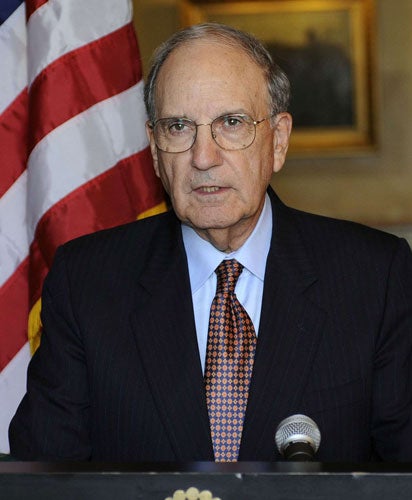Release soldier and we'll end Gaza blockade, says Israel
Olmert tells US envoy that release of Gilad Shalitis crucial to peace deal

Israel will not allow the full re-opening of Gaza's crossings until it has secured the release of Gilad Shalit, the army corporal seized more than two-and-a-half years ago by Hamas and other militants, Prime Minister Ehud Olmert told President Obama's new Middle East envoy yesterday.
Mr Olmert's message came in talks with US envoy George Mitchell, who afterwards said that consolidating the 10-day-old ceasefire was of "critical importance". The tough task facing Mr Mitchell was underlined by Israel's bombing of Rafah tunnels overnight, their latest response to the killing of an Israeli soldier on Tuesday.
In a short statement after his lunch with Mr Olmert, Mr Mitchell said that entrenching the ceasefire would include a "cessation of hostilities", an end to arms smuggling across Gaza's border with Egypt – which had been a central aim of Israel's 22-day offensive – and the re-opening of the Gaza crossings in line with the 2005 agreement brokered by the previous US Secretary of State, Condoleezza Rice.
Israeli officials confirmed that Mr Olmert had made it clear that the full opening of crossings – which would include Karni, the main cargo terminal with Israel, whose 18-month closure has brought Gaza's productive economy to a total collapse – would require the release of Cpl Shalit.
Israel has been arguing that as the 2005 agreement was made with Palestinian President Mahmoud Abbas, his Ramallah-based authority would need to control the Gazan side of the crossings, rather than Hamas.
The reference to the agreement by Mr Mitchell – who will not be meeting Hamas on his visit – appears tosuggest that the new US administration accepts that interpretation.
Mr Olmert is said to have suggested in his talks with Mr Mitchell that Hamas had been sufficiently weakened by Israel's military campaign that the eventual return of the Palestinian Authority to Gaza "in one form or another" was now a possibility.
But Mr Olmert also appears to believe that Hamas could be more willing than it was before to consider releasing Cpl Shalit in a prisoner exchange on terms acceptable to Israel.
Also yesterday, the French foreign ministry said Israeli soldiers had fired two rounds of warning shots at its consul-general's convoy on Tuesday after blocking it for more than six hours.
The British Department for International Development said it has donated £1.5m to help the charities Oxfam and Mercy Corps provide clean drinking water, sanitation and emergency shelter for Palestinians in Gaza, as well as psychological support for traumatised children there.
Hamas has confirmed that it has stopped those wounded during Israel's Gaza offensive from being evacuated to a temporary Israeli hospital at Erez on the other side of the border. Bassem Naim, the Health Minister in Gaza, said the de facto Hamas government would not allow Israel "to brighten its face" by providing treatment."
Meanwhile in a new report on the West Bank, the Israeli pressure group Peace Now disclosed that 1,257 new structures were built in Israeli settlements in occupied territory during 2008 – a 57 per cent increase over 2007. The Annapolis summit on the peace process at the end of 2007 was based on the internationally-agreed road map, which calls for a freeze on all settlement activity.
Join our commenting forum
Join thought-provoking conversations, follow other Independent readers and see their replies
Comments
Bookmark popover
Removed from bookmarks